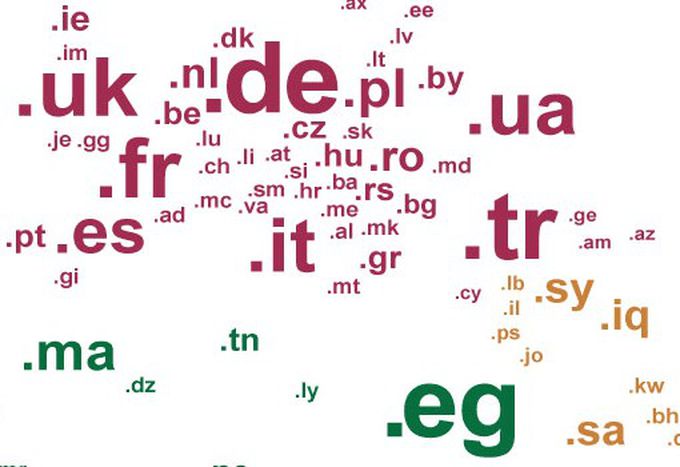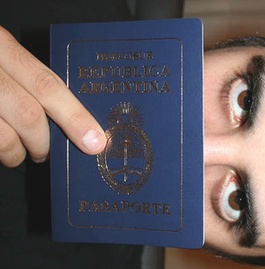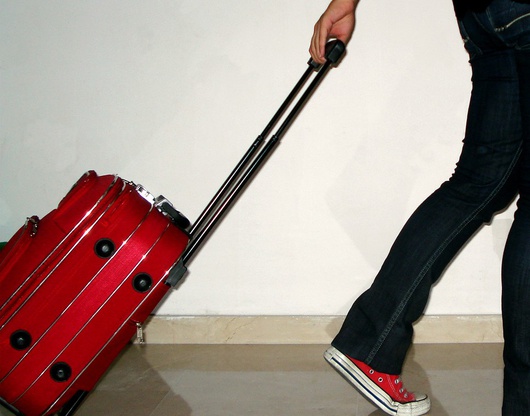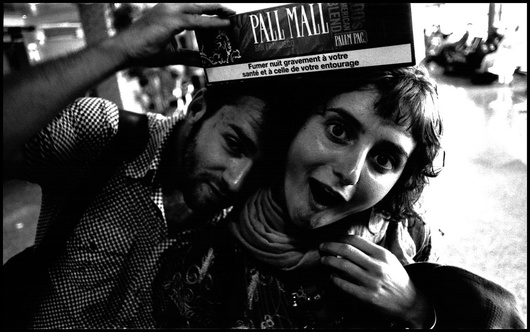
Stupid’s guide to travelling light in Europe
Published on
Translation by:
 mani sharpe
mani sharpe
Luggage, travel necessities, cigarettes, alcohol, calls abroad and insurance: a simple factual list of what you can and can’t do when travelling Europe
 The opening of borders has brought its benefits: no need then for some, from now on, to arm oneself with a passport in order to travel in Europe. European citizens are able to travel freely around all of the countries within the European Union, as well as Norway and Iceland - even when countries are authorised to take special measures in case of a one-off event, like the World Cup. At the end of 2008, Switzerland will also enter the Schengen zone.
The opening of borders has brought its benefits: no need then for some, from now on, to arm oneself with a passport in order to travel in Europe. European citizens are able to travel freely around all of the countries within the European Union, as well as Norway and Iceland - even when countries are authorised to take special measures in case of a one-off event, like the World Cup. At the end of 2008, Switzerland will also enter the Schengen zone.
Schengen is an agreement which abolished internal border controls over the movement of people and goods between member countries. The name comes from a village on the borders of Luxembourg, France, and Germany, where the agreement was signed. Today, the only Schengen exceptions are Britain, Ireland, Cyprus, Bulgaria and Romania, where you need government authorisation in order to come into the country. In addition, do not forget that since 2005, you must possess a passport with an electronic chip or a biometric passport in order to enter America!
Travelling by plane? Prepare for your luggage to be scrutinised
 Before heading off to the sunny beaches of Spain, you are better off paying attention to the way in which you pack your bags if you want to spare yourself the necessity of unloading all of your personal belongings at the airport. Your bags are divided into two categories; those that go into storage, and those which count as hand luggage. The bags in storage have to be registered and weigh between 12 and 40 kg (look at the weight indicated on your flight ticket.)
Before heading off to the sunny beaches of Spain, you are better off paying attention to the way in which you pack your bags if you want to spare yourself the necessity of unloading all of your personal belongings at the airport. Your bags are divided into two categories; those that go into storage, and those which count as hand luggage. The bags in storage have to be registered and weigh between 12 and 40 kg (look at the weight indicated on your flight ticket.)
With regards to hand luggage (taken with you into the aisles,) European legislation is very strict: you can only take very small amounts of liquids with you, which have to be put into little bottles wrapped in transparent plastic bags. These rules apply to all flights departing from a country within the European Union, as well as interior flights, leaving from Norway, Iceland and Switzerland.
On the road: triangles and essential equipment
It’s a legal requirement to have a fluorescent jacket and a warning triangle in case of a road accident
If you have chosen to travel by car rather than plane, there are a few essential pieces of equipment hen you will need to take with you on certain European roads. The French already know that; since the beginning of July 2008, it’s a legal requirement to have a fluorescent jacket and a warning triangle, in case of a road accident. In Spain, you must have a jacket and two triangles. In Italy, a jacket and a triangle are enough - as in Poland, Austria and Portugal.
In addition, if you choose to venture into Germany, England, or Belgium, take a warning triangle with you, but the fluorescent jacket is not obligatory. A few final pieces of advice: you must also have a first aid pack to be able to drive in Belgium, Germany and in Britain, and an extinguisher in Belgium.
Calls abroad never end up cheap
The price of a call for the person who is calling is 0.46 euros, whilst it costs the receiver 0.22 euros
Calls abroad cost - and not only for the person who is calling, but to the person who is being called! The EU has tried everything in order to lower the tariffs. Starting from 2008, the price of a call for the person who is calling will shift to 0.46 euros (37p), whilst it will cost the receiver 0.22 euros (18p). This will be lowered to 0.43 euros (34p) and 0.19 euros (15p) in 2009.
How to light up legally
With regards to the extinguisher, you may well also need one in order to put out your cigarette! In effect, more and more countries are imposing a total ban on smoking in public places. It is illegal to smoke in bars, restaurants and clubs in the following countries: Bulgaria, Denmark, Estonia, Finland, France, and Greece (although the law is not enforced), Hungary, Ireland, Italy, Latvia, Lithuania, Malta, the Netherlands, Poland, Slovakia and Slovenia.
In Germany, the ban on smoking was judged ‘unconstitutional’
However, the majority of these countries tolerate the consumption of tobacco in isolated and ventilated ‘smoking zones’. Although this does not apply to Lithuania and Sweden, in which the law is very strictly enforced. There is a partial ban in Portugal, the Czech Republic and in Romania. In Germany, the ban on smoking was judged ‘unconstitutional’ on 30 July, because it infringes on the rights of the managers of bars to ‘exercise their jobs freely!’
Some countries, for example, Luxembourg or Spain, have put legislation in place based around hours, the type of café or even the area. In addition, if you want to sip on a nice glass of Guinness in a British pub, fag in mouth, don’t forget: it has been banned since 2007.
Alcohol and cigarettes: what you need to know before crossing the boundaries
 There is no duty-free in between European countries. However, it is still possible for you to bring back cut-price alcohol and cigarettes during your escapades in Europe. The fixed amount by border controls is 800 cigarettes, a kilo of tobacco, ten litres of strong alcohol, 90 litres of wine, 110 litres of beer, etc. However, if you want to import cigarettes from certain eastern European countries (Poland, Estonia, Latvia, Hungary, etc) into the majority of western European countries (Germany, France, Austria, Great Britain, Denmark, etc,) the limit is 200 cigarettes! You are probably better off doing your shopping in Spain, where a packet of cigarettes cost between 2.50 (£2) and 3 euros (£2.40), or Italy, where packets cost between 3.50 (£2.80) and 4 euros (£3.20).
There is no duty-free in between European countries. However, it is still possible for you to bring back cut-price alcohol and cigarettes during your escapades in Europe. The fixed amount by border controls is 800 cigarettes, a kilo of tobacco, ten litres of strong alcohol, 90 litres of wine, 110 litres of beer, etc. However, if you want to import cigarettes from certain eastern European countries (Poland, Estonia, Latvia, Hungary, etc) into the majority of western European countries (Germany, France, Austria, Great Britain, Denmark, etc,) the limit is 200 cigarettes! You are probably better off doing your shopping in Spain, where a packet of cigarettes cost between 2.50 (£2) and 3 euros (£2.40), or Italy, where packets cost between 3.50 (£2.80) and 4 euros (£3.20).
Be sure to check yourself before going home at night. The tolerated levels of alcohol whilst driving vary enormously from one country to another. If the islands seem more tolerant with regards to alcohol, (Cyprus, Malta, England and Ireland) with limits ranging from 0, 8 and 0, 9 mg/ml, the continental countries are much harsher. No more than 0, 5 in Germany, Austria, Belgium, Bulgaria, Denmark, Spain, Finland, France, Greece, Italy, the Netherlands, Portugal, and Slovenia. The limit is 0, 4 in Lithuania and 0, 2 in Sweden.
And compose yourself: Estonia, Hungary, Latvia, the Czech Republic, Romania and Slovakia don’t accept any trace of alcohol in the bloodstream whilst driving!
Insurance abroad
 Whether you have drunk a little too much sangria or you are just feeling the heat, don’t worry - you are insured! A European insurance card appeared four years ago. It is free if you have access to the national healthcare in your own country and is valid within the twenty-seven member states of the EU, as well as in Switzerland, Norway, and Ireland and in Liechtenstein. Learn more at the desk of your insurance company.
Whether you have drunk a little too much sangria or you are just feeling the heat, don’t worry - you are insured! A European insurance card appeared four years ago. It is free if you have access to the national healthcare in your own country and is valid within the twenty-seven member states of the EU, as well as in Switzerland, Norway, and Ireland and in Liechtenstein. Learn more at the desk of your insurance company.
Translated from Dans les valises des Européens


